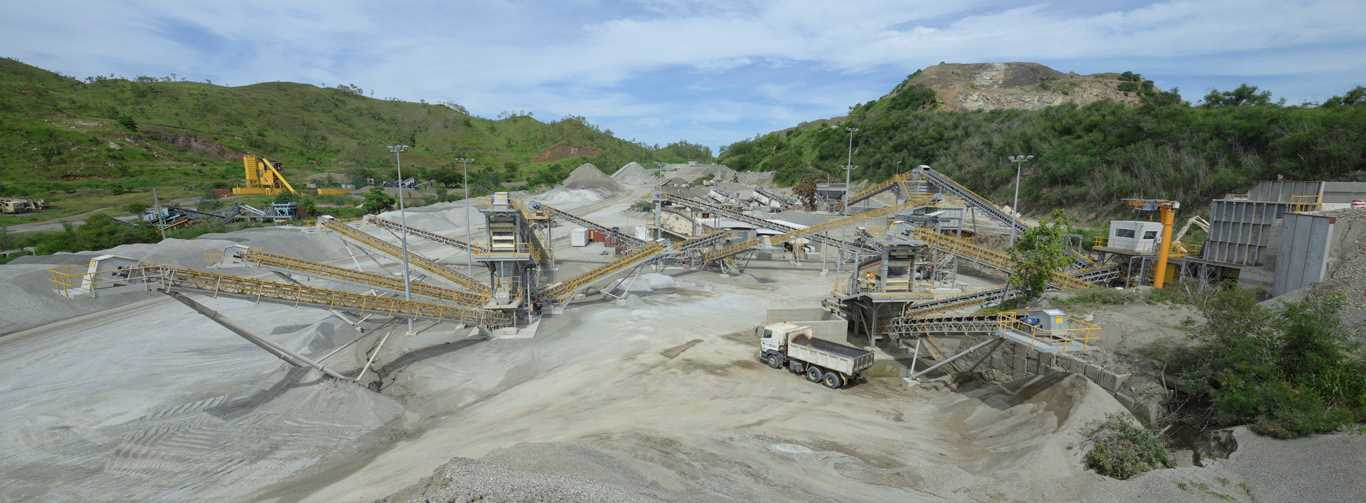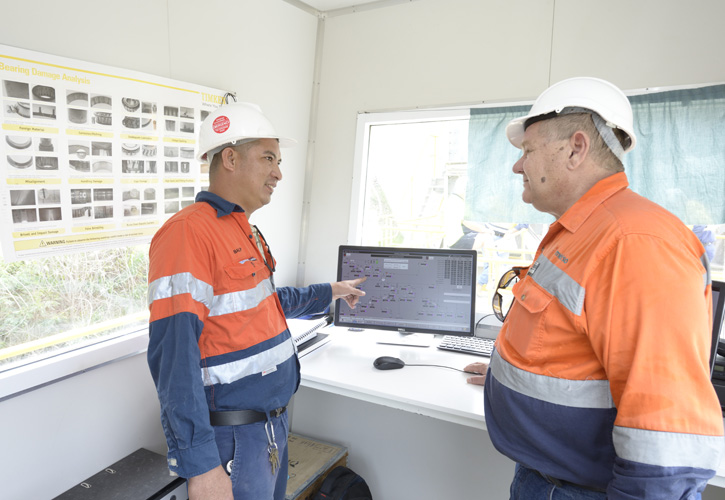The company aspired to build a highly advanced plant that would be seen by the country’s construction industry as ‘the plant of the future’. Importantly, this approach would also allow Monier to become a glowing example of Papua New Guinea’s ability to deploy advanced technologies. So it was vital that the plant featured leading-edge technology that would create new benchmarks in safety, automation, ease of maintenance, production efficiency and versatility.
Understanding the operational requirements and constraints
Campbell Johnston, Metso’s Director - Systems Sales & Support Systems, explains Metso’s approach to the project:“The plant configuration requested by Monier was not typical. Before attempting any design work for our tender submission, we needed to clearly understand Monier’s space constraints and their operational requirements. We decided that the best way to achieve that was for our engineers to visit site,” he said.
“While sending our engineers over to PNG was a costly exercise, it proved to be a very good move. Based on our team’s first hand appreciation of site conditions and an exchange of ideas with Monier’s management, they were able to propose an optimised solution.”
Locating the new plant close to the existing plants was a logistical necessity. Land adjacent to the existing plants was allocated, but it didn’t offer the ideal amount of space for a plant that matched Monier’s production requirements. Metso’s proposal was based on an innovative design, which ensured that the new plant would be compact enough to fit into the allocated area.
Following a rigorous review of submissions from a significant number of potential suppliers, in July 2013 Monier chose Metso as a strategic partner, awarding the company a 10.5 million euro contract for the upgrade. The contract included design, fabrication, installation and commissioning of the new plant.
Metso’s Australasian Systems Business Manager, Glenn Oldfield comments,
“When our final bid was ready, we returned to site with our French based Project Manager, Jean-Marc Tonneau, to present the proposal in person. We were the only company that took the approach of visiting site to understand Monier's requirements and then returning to present a proposal. We wanted to show Monier our commitment to a partnership that could successfully deliver an outstanding solution. Combined with our deep knowledge of Monier's requirements, this helped us to win the order. It set a really good tone for the entire project.”
Project execution and design standards
Delivering the project involved teamwork across three countries: Papua New Guinea, Australia and France. The design and supply of equipment was undertaken by Metso’s team based in the French town of Mâcon. Plant safety had to be in line with Australian OHS regulations and all electrical work was to comply with Australian electrical standards. To best cater for these requirements, Metso Australia took the lead on OHS as well as the plant’s electrical design, installation and commissioning.
In order to comply with Papua New Guinea’s laws, Metso had to set up a local subsidiary. The company’s employees and contractors from outside of Papua New Guinea all needed to have work permits and visas. Setting things up for effective project execution was complex. The process was delayed due to new business and visa procedures that had just been introduced by authorities.
Robert Palmer, Metso’s Australian Project Manager explains how Monier helped Metso to work through these issues: “Customers are not obliged to get involved in a supplier’s logistical problems, but Monier closely partnered with us to get the necessary authorisations. Good collaboration between our two teams is what made all the difference in delivering this complex contract.”
Metso engaged its Australian electrical partner, Peak Industrial Electrical, as well as local PNG companies including; electrical sub-contractor SBS Electrical, and Workforce for the construction work. Vincent Gibert, the Installation Project Manager from Metso in France, said:“The key to the success of this project was the excellent cooperation between our multinational team that included representatives from Monier, Metso and our contractors. From the outset and throughout the project we performed well together. We shared competencies, information and best-practices in each phase from bid to installation.”
“From a Metso point of view, our teams in Australia and France collaborated to engineer a proposal that led to detailed budget estimates and split responsibilities. This is what ultimately delivered the most cost-effective solution for Monier,” he said.
Construction challenges and complexities
With the new plant designed to fit into the allocated space, one problem still remained - there was not enough room for a construction area. Thinking ‘outside of the box’, Metso gained permission to convert a close-by rugby field into a construction zone.
Equipment was transported from the construction zone to the new site as complete and semi-complete assemblies. Access to the new plant is shared with the existing plants, and so an extraordinary level of project management was required to ensure that the movement of equipment and personnel to the new site would in no way hinder production at the existing plants. This required careful planning and strict scheduling by the project team. Good communication between Monier, Metso and all of the contractors was essential.
Plant configuration and production capabilities
The new plant includes four stages of aggregate crushing and screening. The first three stages consist of three crushers in series, each followed by a triple deck screen. In the final stage, there is the option to send all or part of the product for shaping through a vertical shaft impact crusher. A bonus from this stage is a fine aggregate by-product that can be used as an additive in road base.
The plant simultaneously produces up to nine different products at a rate of 350 tonnes per hour. ‘Made to order’ products have no impact on production rates or quality. To achieve this result, Metso worked closely with Monier’s management to develop a design that offers a unique level of flexibility.
Metso’s design allowed for extra capacity and so Monier was delighted when final tests showed that the plant is capable of delivering the nine different products at a rate of 450 tonnes per hour; 100 tonnes per hour more than the contractual requirement.
Achieving outstanding reliability
During pre-contract discussions, Monier’s management had expressed concerns about intermittent power cuts that they experience from time-to-time, mostly without warning. These are caused by unexpected demands on Port Moresby’s electricity grid. Metso addressed these concerns with an electrical design that allows the plant to be run on either main’s power or by diesel generator sets (gen-sets). When power is lost, the gen-sets provide power to the plant without the need for connection to the electricity grid.
The system incorporates an uninterruptible power supply which provides backup power for the PLC and SCADA system. A signal appears on the SCADA screen to let the operator know when mains power is lost. The system also lets the operator know when the gen-sets are ‘run up’ and in operation.
Monier wanted to be assured that their new plant would operate reliably for the next 20 years. To address this, Metso included a five-year Equipment Protection Plan in the contract. Shaun Fanning, Metso’s Australasian Head of Aggregates explains,
“In the unlikely event of component failure we cover all costs, which demonstrates our faith in the reliability of our equipment. This has given Monier a high degree of confidence in the plant’s endurance and performance.”
The plant of the future
In operation the plant has proven to be highly efficient, using 40% less power per tonne than the older plants and delivering 3 times the output of both the existing plants put together. This has been achieved through the combination of the plants high production capacity and a unique design that allows production to continue whilst sections of the plant are offline for maintenance.“The new plant is very advanced in terms of technology, ease of operation and maintenance,” says Stanley Correa, Monier’s Electrical Services Manager. “On the electrical side, the PLC system design is a real stand out for me. From the maintenance diagnostic tools and monitoring equipment that can pin point a problem at its source, right down to the compartmentalised layout and the reporting software.”

